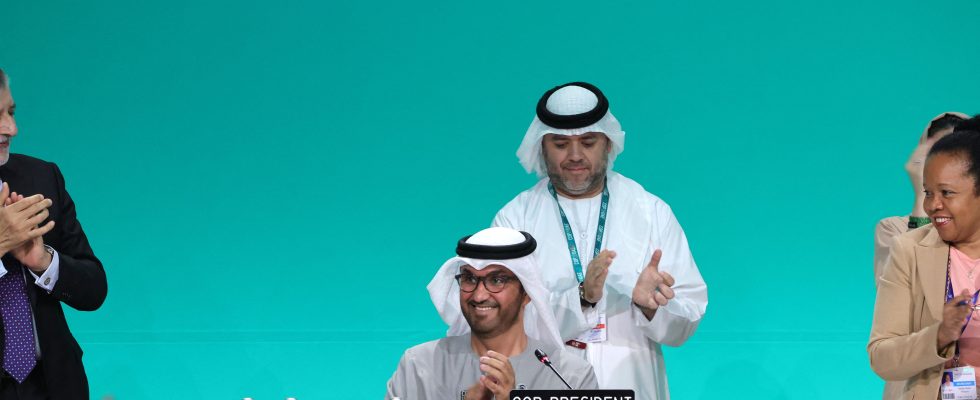“A victory for multilateralism and climate diplomacy”, for Agnès Pannier-Runacher, the Minister of Energy Transition. When the minister of one of the countries least dependent on fossil fuels – 54% of primary energy consumption in France comes from them, when the world average is 82% – is delighted with the agreement reached in Dubai on December 13, it is tempting to think that an ambitious project emerged from nearly two weeks of discussion between the 196 countries gathered to agree on the fight against climate change.
But then, how can we explain that barely a few hours after the final agreement, at the headquarters of the Forum of Gas Exporting Countries, located in Doha, the Qatari capital, its leaders, gathered with those of OPEC, the oil cartel , have they also welcomed the signed agreement? Reading the press release resulting from their meeting is edifying: it reaffirms the “constructive and essential” role of the oil and gas industry “in sustainable development and the eradication of poverty, while contributing to a just energy transition, orderly and inclusive”, and that “it is essential to continue investing in oil and natural gas to meet future demand and guarantee the stability of the global market”.
If anyone still doubts that diplomacy is a profession, the Dubai agreement is a master class. The 245 words of paragraphs 28 and 29 open up all possible futures. Yes, for the first time, all fossil fuels are explicitly targeted: we will have to gradually move away from them, as the English term suggests. transitioning away, delicious wording for linguists and grammar lovers! Behind this term, what is at stake is the debate between producers and consumers of gas and oil. The message from the former is simple: “You want us to reduce our investments in exploration and production? But, in this case, reduce your demand for fossils.” To which the latter respond that production must be reduced so that demand falls…
It is clear that the current European energy crisis rather proves the former right: the Europeans, the main slayers of fossil fuels, have been demonstrating for two years that they are ready, whatever the cost, to secure their fossil supplies. . Moreover, Norway, which has become the key player in stabilizing European energy markets, has just announced a significant increase in its investments in offshore and reassured Europeans about its commitments in terms of gas exports. Difficult, in these conditions, to be credible in denouncing another point of the Dubai agreement on the key role of “transition fuels”, guarantors of “energy security”… Because it is gas which is mainly targeted by this provision required by large emerging countries, starting with India, and which is good for Europeans, who need gas to complement renewable energies.
Supporters of renewable energies are also just as satisfied. The agreement calls for tripling their capacity by 2030, in line with conditions set by the International Energy Agency to stay on the path to carbon neutrality. And what can we say about nuclear lawyers, who, after ten years of cancel culture, finally making a justified comeback, mentioned on an equal footing with renewables as a technology whose deployment must be accelerated? No less was expected in a country, the United Arab Emirates, which, although a newcomer to the nuclear world, has built and connected three reactors to the network in thirteen years. Proof that we can always deploy nuclear power quickly, as long as we give ourselves the means.
Race results? This COP is a bit Fan School on the climate, everyone has 10 out of 10. And a beautiful tribute to Blaise Pascal, whose 400th birth anniversary we are celebrating this year: “It is better to change one’s desires than the order of the world.” We could not summarize this 28th edition better.
* Cécile Maisonneuve is founder of Decysive and advisor to the Ifri Energy and Climate center
